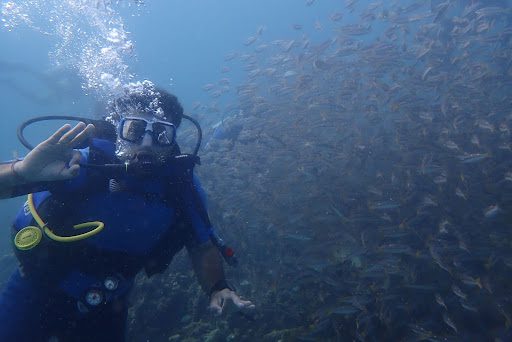
Ready to become a Divemaster? It’s a serious question and will often lead to other inquiries about the industry or its courses. In this blog, we’ll dive into a couple of common questions about what to expect.
As a Divemaster, you are responsible for organizing and leading recreational dives and supervising as a dive guide. You can also teach dive courses and complete scuba reviews.
Another opportunity as a Divemaster is that you are now qualified for the responsibility of overseeing scuba diving operations for salvages or work at a resort.
The Divemaster SCUBA diving lessons are typically very flexible and depending on one’s schedule, can be achieved in three weeks or up to six months. We have trained experts who will be able to provide one-on-one support during the lessons. Expect to learn more about theoretical concepts in the course ranging from the physics of diving to decompression theory and first aid.
When it comes to diving equipment, you want the best tools for the job. Must-haves like a snorkel, mask and dive computers should be at the top of your list. Some other diving equipment you may need to become a divemaster include:
The conditions when trying to achieve a SCUBA certification are some of the most challenging you’ll face. This is because divemasters want to help you flourish in any kind of water, so you can do the same to help your students.
Training typically occurs in a pool or in a confined area of water such as a very calm beach.
Make sure you know how to perform tasks like setting up gear, entering or exiting the water, basic underwater navigation techniques, safety and buoyancy control in any kind of water conditions.
In order to become a divemaster, you need to be 18 years or older, have at least forty (40) dives logged and successfully completed, a signed medical statement from your doctor within the past year before the course, and SCUBA certifications in Rescue Diver and Emergency First Responder courses.
Get ready to be tested on treading water for 15 minutes straight, swimming a distance of 400 meters and snorkeling for 800, and then tow a tired diver for 100 meters. Lastly, make sure you and a buddy know how to do a complete gear swap before obtaining your SCUBA diving certification.
Learning about theoretical dive situations and information will be a breeze if you’re motivated to participate and pass the test as well.
Time management, organization, good communication and patience are very important when it comes to becoming a good Divemaster. Overall, if you strive to be a role model as a dive professional then you will certainly inspire students and help them make progress.

The founder and Divemaster of Dreaming Sea Divers, John Phillips, has been passionate about SCUBA diving since he first took his Open Water Course in 2014. His experience also includes working on dive boats, fill stations and retail stores, so he’s learned a lot and is ready to assist others with fulfilling their dreams of working in the diving industry. John also is excited to meet many serious divers and turn their hobby into an enriching, fulfilling career. After all, who wouldn’t want a career that blends their passions with the ability to teach and earn an income from it all?
Dreaming Sea Divers can help you achieve your diving goals for any lifestyle, so click here to learn more about our programs.